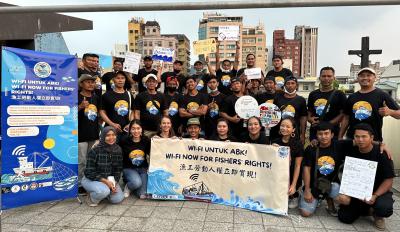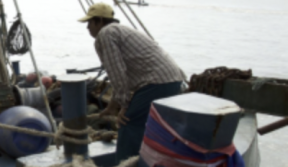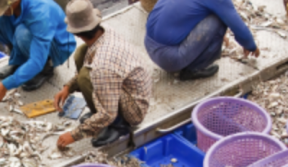
The Groups Say Thailand Should Have Been Downgraded to Tier 2 Watchlist, and Taiwan Downgraded to Tier 2
Washington D.C. – Global Labor Justice and the Wi-Fi NOW for Fishers’ Rights Campaign today said the U.S. State Department is neglecting labor rights abuses in Taiwan and Thailand’s fishing industry as it maintains their current rankings in the latest Trafficking in Persons (TIP) Report. It comes when governments, international brands, retailers, and consumers worldwide are paying renewed attention to the risk of forced labor in the fishing and seafood processing sectors.
“This year's rankings overlook Taiwan and Thailand's repression of workers' rights. The State Department should not acknowledge any country as being fully compliant or making significant efforts to become compliant with the standards to address trafficking if it does not safeguard the freedom of association for at-risk workers, such as migrant workers and fishers. Specifically, labor rights, starting with the rights of all workers, including migrants, should be the primary focus of any effort to combat forced labor and trafficking,” said Jennifer (JJ) Rosenbaum, Executive Director of Global Labor Justice. “The U.S. should only grant Tier 1 or 2 status to countries that ensure migrant workers' fundamental labor rights, including freedom of association, collective bargaining rights, health and safety protections, and non-discrimination protections. Taiwan and Thailand both fail to meet that standard.”
The Seafood Working Group has called on the U.S. State Department for a long time to utilize its diplomatic influence to advocate for the protection of labor rights. This year, the organization published independent reports on Thailand and Taiwan, detailing each government's failure to prevent and address violations of labor rights, forced labor, and human trafficking of migrant workers. The Seafood Working Group has also urged the U.S. State Department to lower the rankings of both countries in the TIP Report, which serves as the primary diplomatic instrument of the U.S. government for engaging with foreign governments on human trafficking.
The TIP report, released today, maintains Taiwan at Tier 1 and Thailand at Tier 2.
Migrant fishers and fishing workers in Taiwan and Thailand, along with their labor organizations and allies, have called for critical changes to the industry to enable fishers in both countries to exercise their fundamental labor rights.
Despite the 2024 TIP Report undervaluing labor rights in its rankings, the U.S. Government must take definitive action to champion labor rights in both countries' fishing and seafood processing industries through policymaking.
Taiwan is not fully compliant with TIP standards to remain at Tier 1
While the TIP Office has chosen not to advance the interests of labor in its assessment of Taiwan, the U.S. government should be using the U.S.-Taiwan Initiative on 21st Century Trade to protect and enhance workers' rights, including migrant fishers, in Taiwan. As part of any successful trade initiative that addresses forced labor in global supply chains, the Taiwanese government should continue to improve its regulatory practices in advancing the rights of distant-water fishers — in particular, ensuring satellite internet access and fishers’ freedom of association rights on the high seas.
“Migrant fishers in the Taiwanese fleet continue to be completely cut off from the outside world while spending up to ten months at sea. Access to Wi-Fi on board is crucial for safeguarding workers' rights, preventing forced labor, and preserving the mental well-being of workers on the open sea,” said Ahmed Mudzakir, Chairman, Indonesian Seafarers’ Gathering (FOSPI)
“The Taiwanese and American governments have pledged to tackle forced labor as part of the trade initiative prioritizing worker welfare. They should consider access to Wi-Fi as an indicator of significant advancements in promoting freedom of association and preventing forced labor among migrant fishers,” said Yi-Hsiang Shih, Secretary General of Taiwan Association for Human Rights (TAHR).
Taiwan has the second largest distant-water fishing fleet after China and exports 1 billion dollars in seafood annually to the United States, Japan, and the EU, among other markets. Factors like isolation at sea, withholding wages, recruitment fees, excessive working hours, and crew lack of access to communication technologies such as Wi-Fi can all drive forced labor.
As part of the Wi-Fi NOW for Fisher’s Rights Campaign, migrant fishers and their allies call on the world’s biggest seafood brands, retailers, and investors to support their fight for fundamental labor rights, including Wi-Fi on every vessel.
Thailand falls short of minimum standards
The State Department should have lowered the government of Thailand’s ranking to a Tier 2 Watchlist, in recognition of the fact that Thai law still prohibits migrant workers, including the approximately 4 million Southeast Asian migrant workers, from forming or leading labor unions– which are critical to combatting forced labor– in violation of fundamental labor standards. In Thailand, migrant fishers and seafood processing workers, along with their supporters, are calling for eliminating discrimination from the Labor Relations Act that limits the opportunity to form a union to exclusively Thai citizens.
“It is discouraging to see the US maintain its current TIP ranking on Thailand, because many workers—particularly migrants in the seafood and fisheries sectors—experience horrific working conditions and severe health and safety risks,” said Rossen Karavatchev, The International Transport Workers' Federation (ITF) Fisheries Section Coordinator. “Many migrant workers pay exorbitant and illegal broker or recruitment fees, arriving in Thailand in severe debt bondage, and are threatened with violence or arrest if they try to leave or change employers. Migrant workers are not allowed to change employers freely, as the law requires sign-off from their current employer, and are denied freedom of movement. When these workers try to stand up for their fundamental human rights, many are threatened by their employers, blacklisted, or forcibly deported. Thailand has not ratified ILO Conventions 87 or 98 and does not allow migrant workers the right to organize their own union to protect their fundamental labor rights. Furthermore, the current government's planned rollbacks to the Fisheries Act would allow the same conditions of forced labor at sea for fishers that preceded the EU yellow card in 2015. Not downgrading Thailand is a missed opportunity to highlight the major labor abuse happening in Thailand and pressure the government to take action.”
According to the Seafood Working Group TIP report,“Thailand’s fishing sector continues to remain high-risk for forced labor. A comprehensive national survey of more than 1,000 migrant fishers in 15 ports in Thailand conducted by the Fishers Rights Network in November and December 2023 documented a high rate of a wide range of forced labor indicators in Thailand’s fishing sector. Of the fishers surveyed, 83.6% had all of their documents retained by the vessel captain or owner, including their passports, work permits, identity certificates, employment contracts, bank cards, and bank books. The survey also revealed that 87% of fishers were subjected to debt bondage.”
For Further Information:
Seafood Working Group TIP Report for Thailand
Seafood Working Group TIP Report for Taiwan
Wi-Fi NOW for Fisher’s Rights Campaign is an international campaign with U.S., Taiwanese, and Indonesian allies, including Indonesian Seafarers Gathering Forum, or Forum Silaturahmi Pelaut Indonesia (FOSPI), Global Labor Justice - International Labor Rights Forum (GLJ-ILRF), Taiwan Association for Human Rights (TAHR), Stella Maris Kaohsiung, Humanity Research Consultancy (HRC).
###


